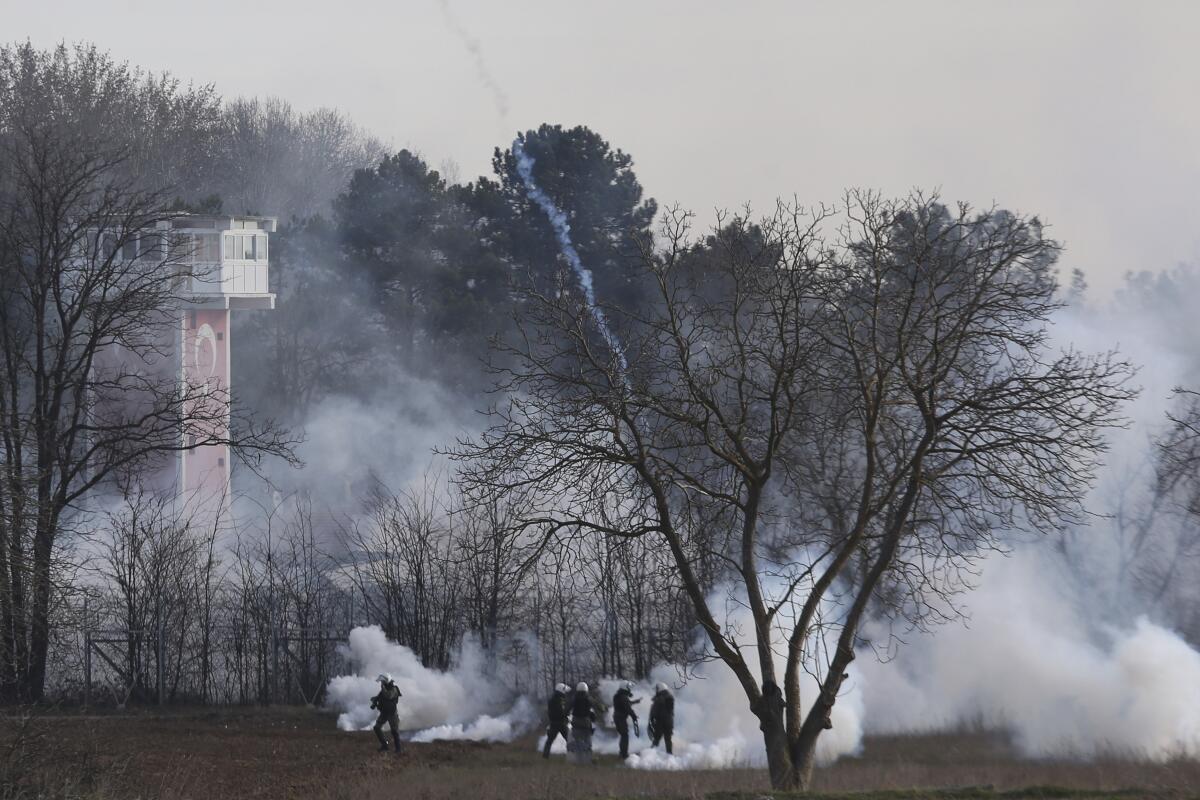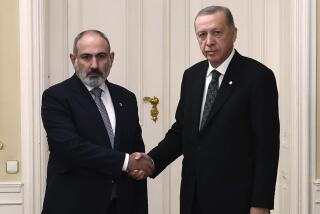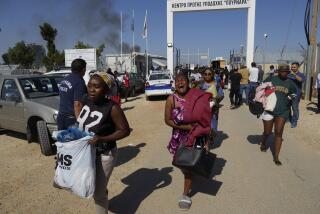Migrants, police clash again on Greek-Turkish border

- Share via
KASTANIES, Greece — Clashes between Greek riot police and migrants attempting to cross the border from Turkey erupted anew Friday as European Union foreign ministers held an emergency meeting to discuss the situation on the border and in Syria, where Turkish troops are fighting.
Greek riot control police used tear gas and a water cannon to drive back people trying to cross the land border in the morning. Turkish police fired volleys of tear gas back toward Greece.
Thousands of refugees and other migrants have been trying to get into Greece through the country’s eastern land and sea borders in the last week after Turkey declared its previously guarded borders with Europe were open.
Turkey’s interior minister said Thursday that the government planned to deploy 1,000 special operations police to prevent Greek authorities from forcing back migrants who managed to cross.
Many asylum-seekers have been camping out on the Turkish side despite Greek insistence that its border is closed. Reporters were kept away from the border area on the Turkish side but saw at least one bus full of people leaving the area Friday morning. It was unclear where the bus was headed.
Mohammad Omid, an Afghan who has been at the border for five days with his wife, said Turkish police told him to go to there.
“We don’t know what is happening. We are like toys to them,” he said in the border town of Edirne. “We are like a ball to them. Everyone passes us to this side and the other side. I don’t know what will happen to us.”
After months of threats, Turkish President Recep Tayyip Erdogan has said his country will no longer be the gatekeeper for Europe. He has demanded Europe shoulder more of the burden of caring for refugees, although the European Union insists it is abiding by a deal in which it disbursed billions of euros in refugee aid in return for Turkey keeping Europe-bound migrants and refugees on its soil.
His decision and its aftermath have alarmed EU countries, which are still seeing political fallout from mass migration that started five years ago.
Erdogan’s move came amid a Syrian government offensive in Syria’s northwestern Idlib province, where Turkish troops are fighting. The Russia-backed offensive has killed dozens of Turkish troops and sent nearly a million Syrian civilians toward Turkey’s sealed border.
Erdogan and Russian President Vladimir Putin brokered a cease-fire for Idlib that took effect at midnight. It was not clear whether the agreement would also affect the situation on the Turkish-Greek border. Greek officials have repeatedly stressed those attempting to cross the border are not refugees from Idlib, and mostly not Syrian.
Speaking to a group of journalists on his return from Moscow, Erdogan signaled that there would be no change to Turkey’s policy.
“We don’t have time to discuss with Greece whether the gates which we opened are now closed. That business is over,” Turkey’s state-run Anadolu Agency quoted Erdogan as saying. “Our gates are open. The refugees will go as far as they can. We are not forcing them to leave.”
Erdogan also accused Greece of cruelty in its treatment of the migrants and told reporters he refused to attend a possible meeting in Bulgaria to discuss the migration issue. He said he did not want to appear “in the same frame” as the Greek prime minister.
EU foreign ministers met in in Zagreb, Croatia, to discuss an emergency meeting on Syria and the immigration pressure at the Greek border.
EU foreign policy chief Josep Borrell welcomed the Syria cease-fire.
“Let’s see how it works. That is the precondition in order to increase humanitarian help for the people in Idlib,” he said.
Borrell said the EU needs to improve relations with Turkey and Russia, adding the ministers will discuss more funds for Turkey. He wouldn’t provide details or say how many countries support or oppose the idea.
“Turkey is having a big burden, 4 million people, we have to understand that,” Borrell said. “But at the same time we cannot accept migrants being used as a source of pressure.”
Dutch Foreign Minister Stef Blok, however, said he opposed more aid for Turkey, criticizing the “cynical way” Erdogan was using refugees.
“We should not react to the pressure that Turkey is exerting on us by agreeing to more money under pressure,” he said.
Austrian Chancellor Sebastian Kurz accused Turkey of carrying out an “organized attack on Greece.”
In an interview with Germany’s Funke media group published Friday, Kurz said: “A week ago we didn’t have a humanitarian crisis in Greece, no crisis on the Turkish-Greek border and also none in Turkey. This is a planned and targeted attack, directed and organized by the state. Europe must not give in to this pressure.”
Greek Foreign Minister Nikos Dendias said the situation on the borders would also be discussed at the meeting.
“We are facing a mass movement of migrants towards the borders of Greece and Europe,” he said. “Migrants who have been living in Turkey for years. We have clear proof that this population movement has been created and orchestrated by Turkey.”
Greek authorities have said Turkish authorities have deliberately fired tear gas at the Greek frontier to disperse border guards and so allow migrants to enter.
Irish Foreign Minister Simon Coveney said the EU should rally around Greece.
“The European Union needs to act collectively; we cannot allow one member state or two member states to carry an unfair burden,” he said as he arrived for the Zagreb meeting.
However, he said it was unacceptable for Greek police to fire rubber bullets at migrants.
“We’ve got to treat people as human beings,” he said. “While I accept there are pressures on security forces and police officers on the border there because there has been panic.... I think we have to act with restraint.”
On the Greek side of the border, authorities were using locals with better knowledge of the terrain to apprehend those who manage to cross, either by cutting holes in the border fence or by crossing the Evros river — Meric in Turkish — that runs along most of the border.
“We were born here, we live here, we work here, we know the crossings better than anyone,” said Panayiotis Ageladarakis, head of the community of the border village of Amorio.
Hundreds of people have also headed to Greek islands from the nearby Turkish coast. A young boy died this week when the dinghy he was in capsized off the island of Lesbos.
After a one-day surge in arrivals early in the week, bad weather hampered more sea crossings. The Greek coast guard said Friday that 59 people arrived to the islands the previous day, 17 of them rescued off the island of Kos and 42 reaching Lesbos.
More to Read
Sign up for Essential California
The most important California stories and recommendations in your inbox every morning.
You may occasionally receive promotional content from the Los Angeles Times.










